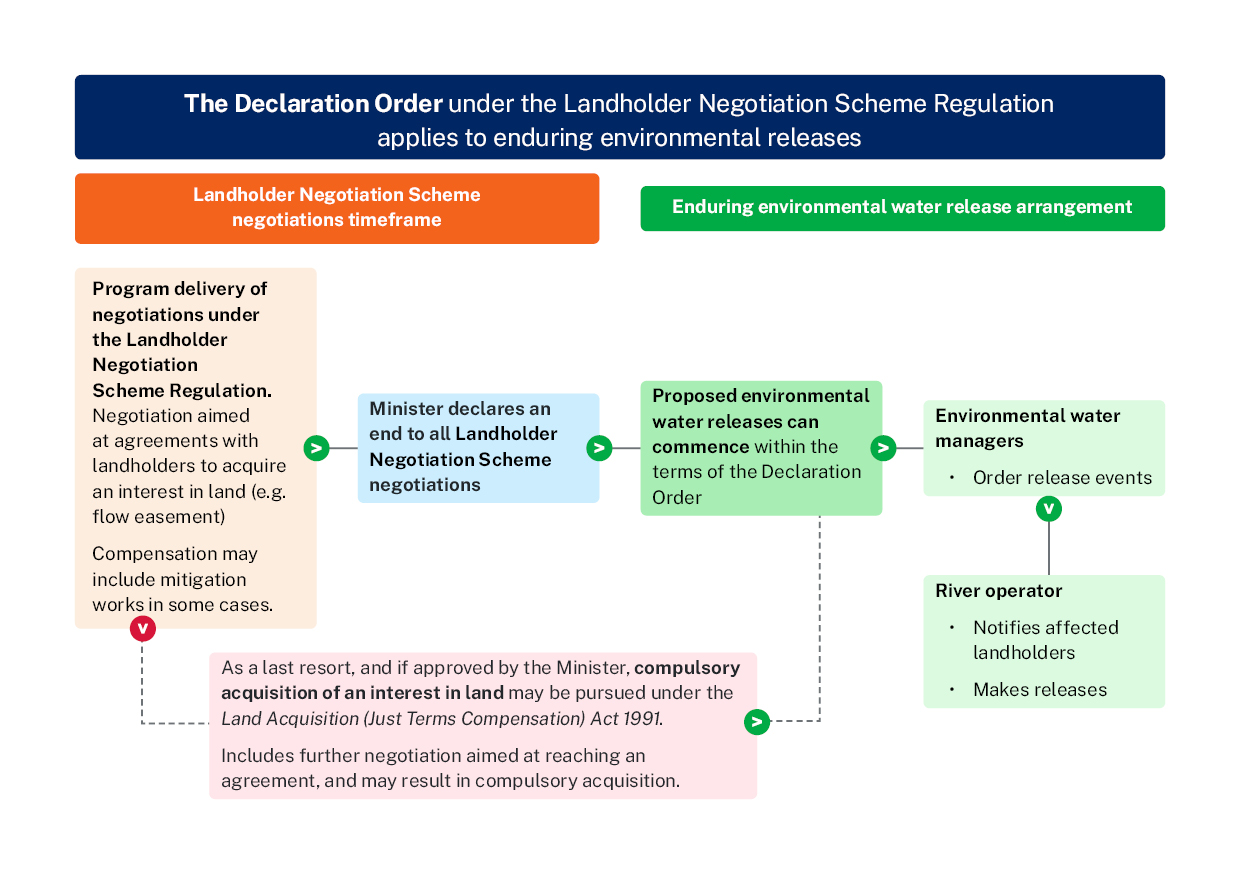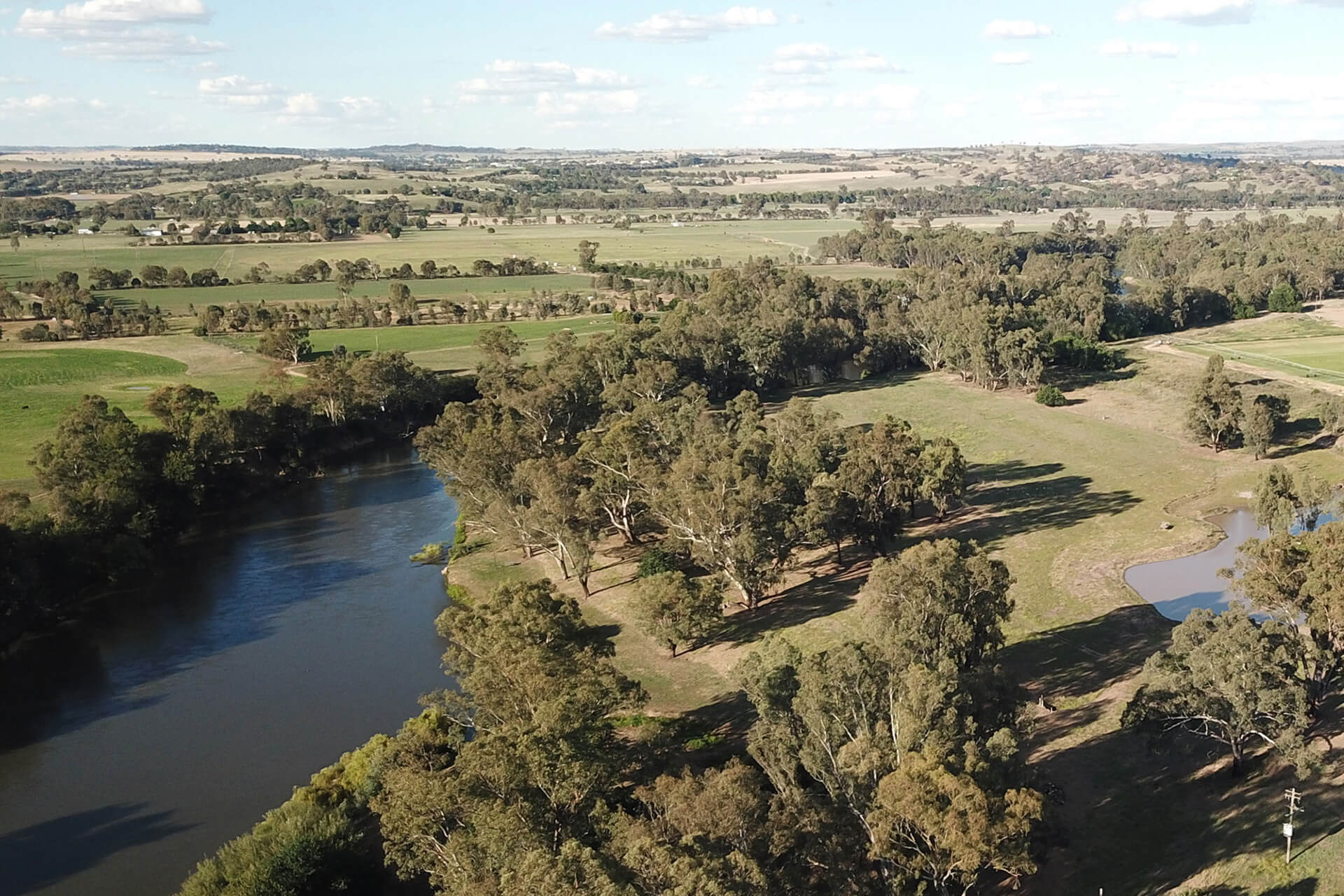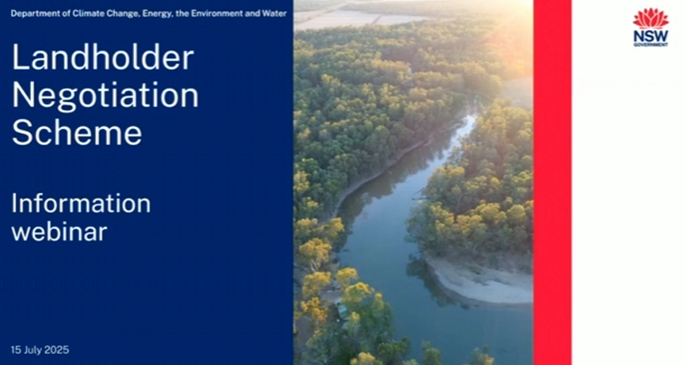Declaration Order under the Landholder Negotiation Scheme announced for Reconnecting River Country Program Murrumbidgee Project
The NSW Minister for Water, Rose Jackson MLC, gazetted the Water Management (General) Regulation Landholder Negotiation Scheme Order (No. 1) 2025 for the Reconnecting River Country Program’s Murrumbidgee Project on 29 August 2025.
This marks the first Declaration Order gazetted under the Landholder Negotiation Scheme (LNS).
For more information about the Declaration Order for the Reconnecting River Country Program Murrumbidgee Project and what it means for affected landholders.
Find out more about the Declaration Order
Landholder Negotiation Scheme commencement
Following extensive community engagement and a state-wide public exhibition process, the NSW Government declared the Landholder Negotiation Scheme (LNS) as an amendment to Schedule 9 of the Water Management (General) Regulation 2018 under the Water Management Act 2000, accompanied by statutory Negotiation Guidelines.
The LNS is now available for use by NSW Government programs.
It sets out the approach the NSW Government will take when negotiating voluntary agreements with landholders affected by future environmental water deliveries at higher flow levels, or under different regimes, than current operating practice.
An outline of changes made, in response to submissions received during the public exhibition process in 2024, is provided in the What we heard report released May 2025.
The Water Management (General) Regulation 2018 was repealed on 1 September 2025 and remade as the Water Management (General) Regulation 2025 on the same date.
The provisions relating to the LNS remain the same, but they now have different numbering and are now located in Schedule 9 of the regulation.
The LNS Negotiation guidelines have been updated to align with the new regulation. No other changes have been made to the guidelines. The Minister for Water approved the updated Negotiation guidelines which came into effect on 1 September 2025.
For more information:
About the Landholder Negotiation Scheme
The LNS is designed to protect the interests of landholders affected by NSW Government environmental water projects. It provides a clear, equitable, fair and consistent process for reaching voluntary negotiations.
It ensures negotiations are carried out in good faith, giving certainty to landholders about how negotiations will take place and what support services are available through the process.
The LNS goes beyond what is required under the Land Acquisition (Just Terms Compensation) Act 1991. It allows more time for negotiations and gives landholders access to independent facilitators and mediators to help reach fair outcomes.
Under the LNS, WaterNSW is required to give prior notice to affected landholders where there is a declared environmental water release. You can register to receive flow notifications through the WaterNSW website.
The LNS is designed to make the negotiation process:
- clear and straightforward to follow
- transparent, equitable, fair and consistent for all affected landholders
- time-bound
- focused on achieving fair and reasonable outcomes on just terms.
Next steps
The LNS is now available to be used by the NSW Government.
Under the LNS, the NSW Minister for Water can make a Declaration Order for a proposed enduring environmental water release arrangement. This order outlines:
- the environmental water release arrangement, including the anticipated timing, duration, frequency and extent; and,
- an area of land likely to be affected .
A Declaration Order is published in the NSW Government Gazette and on the NSW Department of Climate Change, Energy, the Environment and Water website.
The LNS only applies to new and continuing environmental water release arrangements that go beyond current operating practice and are formally gazetted under a Declaration Order.
The scheme will support delivery of environmental initiatives under the Murray-Darling Basin Plan, such as the Reconnecting River Country Program and the Gwydir Reconnecting Watercourse Country Program.
Legislative amendments to Section 398(1)(c) and s399B
Two changes to the Water Management Act 2000, passed by the NSW Parliament in 2018, have now commenced alongside the LNS to support the delivery of environmental water programs.
- Section 399B: This new administrative provision allows for the LNS to be made.
- Section 398(1)(c): This amendment makes clear WaterNSW is excluded from civil liability when it releases water for environmental purposes in good faith. Releasing water in good faith means WaterNSW must, among other things, follow legislation and procedures when releasing water for an environmental purpose.
Community engagement
Community feedback: LNS What we heard
Community and landholder feedback has been central to shaping the LNS.
The LNS What we heard report (PDF. 1,44MB), released May 2025, outlines the changes made in response to submissions received during the public exhibition period. We thank everyone who shared their feedback on the draft LNS Regulation amendment and negotiation guidelines.
Webinar recordings, presentation and responses to questions
Thank you for registering to attend one of our recent webinars on the Landholder Negotiation Scheme. We appreciate your time and hope you found the session informative.
If you would like to revisit the information shared, or were unable to attend, the webinar recordings and presentation are now available below.
Presentation
The presentation provided at both webinars is now available.
Questions and answers
During the webinars there were some questions and answers were provided.
Supporting documents
Download the documents:
Frequently asked questions
Legislating the Landholder Negotiation Scheme (LNS) ensures the NSW Government follows a fair, transparent and consistent process when negotiating with landholders affected by proposed changes to environmental water releases arrangements.
The LNS provides a clear framework for good-faith negotiations that ensures the interests of landholders are appropriately considered when enduring changes to environmental water release arrangements are made.
It also provides for mediation and facilitation services to be made available and for WaterNSW to provide flow notifications.
Once a Declaration Order is published in the NSW Government Gazette and on the department’s website, affected landholders will receive a written invitation to negotiate. All reasonable steps will be taken to identify and contact landholders.
- Landholders will have 28 days to respond to the invitation. This may be extended in some circumstances.
- The 12-month negotiation period begins once the invitation is accepted. This negotiation timeframe may be extended in some circumstances.
- If many landholdings are affected, negotiations may be staged. If this occurs not all landholders will be invited to negotiate at the same time but they will be kept informed.
Every reasonable effort will be made contact a landholder specified within a Declaration Order. Where, after all reasonable efforts have been made, a landholder is unable to be located and given a notice under the LNS, it may be determined the negotiation is unable to occur and the LNS process may be ended.
This does not preclude the possibility that, in future, the landholder may be located and invited to participate in negotiations.
If a landholder formally declines an invitation to negotiate, or does not respond within the required timeframe, the Ministerial Corporation may end the negotiation.
Under Schedule 9, section 6 of the Water Management (General) Regulation 2025, negotiations end when:
- an agreement is reached; or
- the 12-month negotiation period expires; or
- the Ministerial Corporation determines the negotiation is unlikely to succeed or is unproductive.
Each landholder will work with a dedicated Personal Manager to assess how their land is used and how it may be affected by proposed environmental water releases.
- Landholders can provide information to valuers to inform their valuation assessment.
- Valuations will include consideration of potential impacts to land and/or assets, including changes in market value and to compensate landholders.
- Compensation may include financial payments or where eligible mitigation works in lieu of or in addition to financial compensation.
- Landholders can appoint their own legal and valuation advisors to negotiate a settlement.
- Landholders are also encouraged to obtain their own legal and tax advice.
The 12-month negotiation timeframe may be extended by agreement between the Ministerial Corporation and the landholder.
No. Negotiations and agreements are specific to each individual landholding.
The LNS is an additional voluntary process and timeframe that NSW Government will adopt to negotiate agreements with landholders, as part of environmental water programs, seeking to deliver enduring changes to delivery of environmental water.
By creating the LNS, the NSW Government is ensuring the interests of affected landholders are appropriately considered in program delivery. The LNS will provide landholders with sufficient time to understand the nature of the proposed agreements and what it means for their individual circumstances to make informed decisions.
The Land Acquisition (Just Terms Compensation) Act (Just Terms Act) is existing legislation providing an established process for government acquisition for public interest projects. It establishes a minimum period for the government and landholders to try to reach agreement and outlines the factors to be considered to determine compensation on just terms. The Just Terms Act existing processes remain unchanged by the making of the LNS.
Compensation for flow easements will be determined in accordance with the Just Terms Act which considers:
- market value of the land on the date of its acquisition
- any special value of the land to the person on the date of acquisition
- any loss attributable to severance
- any loss attributable to disturbance
- the disadvantage resulting from relocation
- any increase or decrease in the value of any other land, adjoining or is severed from the acquired land.
Consistent with the Just Terms Act, this compensation will be payable in the form of a one-off payment.
An independent valuer will assess the impacts of proposed environmental water releases and the acquisition of an interest in land as outlined in the Negotiation Guidelines.
Landholders are encouraged to appoint their own valuer and legal representative to contribute to negotiations.
Reasonable legal and valuation costs may be reimbursed.
Landholders will be informed about their rights to compensation and reimbursement of legal and valuation fees as part of the written invitation to negotiate and throughout the negotiation process.
Compulsory acquisition of a flow easement is a last resort measure and would only be considered if:
- an agreement cannot be reached under the LNS; and
- the flow easement is essential for delivering future environmental flows.
The Minister for Water must approve any proposals for compulsory acquisition of an interest in land and this will be done on a case-by-case basis. Factors considered include:
- the proportion and location of the affected land;
- the impact of inundation on the current land use and ongoing property viability.
Not all unsuccessful negotiations will result in compulsory acquisition of an interest in land.
No. The Ministerial Corporation must determine compensation for the acquisition of an interest in land (i.e., flow easement) consistent with section 55 of the Just Terms Act. According to the Act, determining the amount of compensation must be informed by:
- the market value of the land on the date of its acquisition
- any special value of the land to the person on the date of acquisition
- any loss attributable to severance
- any loss attributable to disturbance
- the disadvantage resulting from relocation
- any increase or decrease in the value of any other land, adjoining or is severed from the acquired land.
Yes. Consistent with section 59 of the Just Terms Act, where negotiations result in an agreement, compensation will be available for:
- legal costs reasonably incurred
- valuation fees of a registered valuer reasonably incurred
- if the negotiation relates to the need to reconfigure or adjust the actual land uses, the financial costs reasonably incurred by the landholder directly in respect of the negotiation of those matters
- in recognition of the need for mental health support a Property Acquisition Support Line will be available to landholders delivered by a team of qualified psychologists and social workers.
Affected landholders will be advised of what costs are eligible for reimbursement as part of the formal invitation to negotiate.
The Ministerial Corporation must explain whether fees reasonably incurred for negotiations under the LNS Regulation will be reimbursed if agreement is not reached. This will be provided in writing as part of the invitation to negotiate. Individual programs will be required to inform landholders up front about reimbursement of costs reasonably incurred during negotiations. The Reconnecting River Country Program intends to reimburse legal and valuation costs reasonably incurred during negotiations even if an agreement is not reached.
Yes. Under the LNS, WaterNSW is required to provide adequate notice to landholders ahead of a declared environmental water release through an opt-in flow notification scheme.
For the Reconnecting River Country Program in the Murrumbidgee, negotiations are likely to commence in 2025 with some impacted landholders up to December 2026.
No, the LNS does not apply to current negotiations with landholders involved in SDLAM Acceleration projects.
The LNS will only apply to land specified in a gazetted Declaration Order. Under the LNS, the NSW Minister for Water can make a Declaration Order for a proposed enduring environmental water release arrangement. This order will outline the details of the environmental water release arrangement, such as anticipated timing, duration, frequency and extent and identifies the land likely to be affected. The Declaration Order will be published in the NSW Government Gazette and on the NSW Department of Climate Change, Energy, the Environment and Water website.
No, the LNS does not apply to current negotiations with landholders involved in these projects.
The LNS only applies to land specified in a gazetted Declaration Order. Under the LNS, the NSW Minister for Water can make a Declaration Order for a proposed enduring environmental water release arrangement. This order will outline the details of the environmental water release arrangement, such as anticipated timing, duration, frequency and extent and identifies the land likely to be affected. The Declaration Order will be published in the NSW Government Gazette and on the NSW Department of Climate Change, Energy, the Environment and Water website.
It is NSW Government policy that river operators should have statutory protection from civil claims when they make releases of water for environmental purposes in good faith.
In 2018, the NSW Parliament passed amendments to the Water Management Act 2000 (WM Act), including an amendment to section 398 to clarify that the exclusion of river operator liability also apply to releases of water for environmental purposes, when these releases are made in good faith. This amendment ensured that statutory civil liability protections were consistent.
These liability protections have been in place since the WM Act commenced. Notably, section 398 already provided liability exclusions for actions done in good faith, such as releasing water from water management works, before the 2018 amendments were made. When the WM Act was developed (pre-2000), there was no held environmental water, so the legislation did not provide a framework for managing it.
The 2018 amendments to section 398 clarify that the civil liability protection under section 398 also applies to releases of water for environmental purposes. This is intended to include proposed changes to environmental water releases under programs such as the Reconnecting River Country Program and the Gwydir Reconnecting Watercourse Country Program.
To be clear, these new flow arrangements for these programs won’t begin until after the Minister for Water declares an end to negotiations under the Landholder Negotiation Scheme (LNS), which will not occur before December 2026.
The NSW Government remains committed to seeking agreements with all affected landholders and ensuring appropriate compensation before these changed environmental flow arrangements commence. This process is a key part of demonstrating good faith.
No. The statutory protection provided under section 398 of the WM Act only applies where the NSW Government or prescribed authority have acted in good faith.
An exclusion of Crown liability for acts or omissions done in good faith and in the exercise of functions under the WM Act has been part of the legislative framework under the WM Act since its inception, and the notion of ‘good faith’ is commonly used in NSW legislation.
The amendment to section 398 of the WM Act means that river operators must make these environmental releases in good faith to receive statutory protection for these releases. Whether a relevant action or omission was done in good faith for the purposes of section 398 will be dependent on the specific circumstances that exist at the time the claim is made. In general terms, matters which might demonstrate good faith may include, for example:
- adhering to all relevant legislation, policies and procedures, such as river operation procedures to ensure a risk-based approach to delivering environmental water releases
- use of the latest data and modelling.
A Declaration Order, made under Schedule 9, section 3 of the Water Management General Regulation 2025, turns on the LNS for a proposed environmental water release arrangement in a particular area. The proposed environmental water release arrangement will not commence until the Minister for Water declares that all negotiations under the LNS are complete.
Declaration Orders must be published before negotiations under the LNS can commence. The process from Declaration Order to commencement of any proposed environmental releases is described in the figure below.

For the Murrumbidgee project of the Reconnecting River Country Program, landholder negotiations are expected to begin later in 2025, following the publication of a Declaration Order. The project may be delivered in phases. If this occurs, the Declaration Order will be updated to include different parts of the river where LNS negotiations will be conducted.
Contact us
For more information call us on 1300 081 047 or email us at water.enquiries@dcceew.nsw.gov.au

